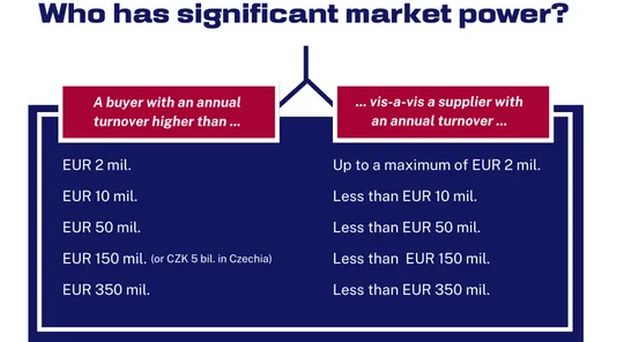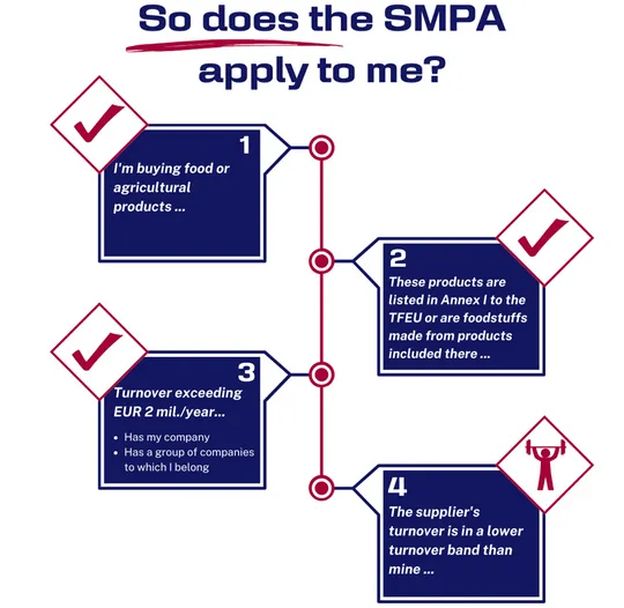When the former version of the SMPA was in force, virtually only the operators of food retail chains had significant market power. The amendment to the SMPA, which takes full effect on January 1, 2024, has substantially broadened the scope of companies affected and the group of products subject to the regulation. In this episode, we will focus on these changes. From now on, it is no longer sufficient to look for (market) power only in cheese, but also, for example, in fresh cut flowers.
A simple comparison shows the extent of these changes.
The previous legislation focused on buyers of food products by final retailers whose turnover from food sales in the Czech Republic exceeded CZK 5 billion. In practice, therefore the law applied only to eight specific entities. Until recently, they had to comply with the SMPA rules in relation to all their food suppliers.
Following the amendment, buyers of food and agricultural products at any level of the supplier-buyer relationship may infringe the SMPA in the form of unfair commercial practices. This applies even if the turnover of the buyer is considerably lower than the aforementioned CZK 5 billion (in addition to the turnover generated not only by food sales and not only on the territory of the Czech Republic).
On the other hand, the turnover of the supplier in question is now also decisive in determining whether the contractual relationship with a particular supplier falls under the SMPA. This means that with some suppliers the buyer has to comply with the obligations of the SMPA, while with others it does not. But let's take this step by step.
From farm to fork
Firstly, the amendment to the SMPA extends the scope of the Act to the entire agricultural and food vertical.
It has not changed the fact that only buyers have special obligations under the SMPA. However, these may now include food manufacturers, food brokers, producers, wholesalers and many more. In addition, the SMPA may now also impose obligations on companies in the HORECA sector (hotels, restaurants, cafés and catering), hobby markets or petrol station operators.
All they need to do is be buying food or agricultural products. And that is a rather broad definition. First of all, it includes all the items listed in Annex 1 of the Treaty on the Functioning of the EU (this is the list of agricultural products covered by the EU's common agricultural policy, the terminology referring to the customs nomenclature). In addition to particular foodstuffs, this list also contains agricultural commodities or partially processed agricultural products. Even those that may be intended for animal feed or processing in the non-food industry at the next stage of processing.
You might think that this is at last a complete list of products – the SMPA applies to those products included in Annex 1. But there is another part of the definition. This covers products processed for use as food, provided they consist of at least one item from this list. To put it simply, this is likely to be any product intended for human consumption (in addition to the items directly mentioned in the list).
As a result, the buyers of live animals or their processed parts or those who purchase seeds or flowers for resale (including freshly cut ones) may also have new obligations under the SMPA. On the other hand, the law does not apply to the supply of pharmaceutical or cosmetic products.
However, given the broad definition of the products concerned as mentioned above, this does not necessarily exclude pharmacies or drugstores from being subject to obligations under the SMPA. Hospitals or school facilities are also considered as buyers, even if they are established and operated by the public sector.
The bigger, the more likely under SMPA
In order for the SMPA rules to apply to a buyer in a particular business relationship, they must still have significant market power, of course.

A buyer with an annual (worldwide) turnover of less than EUR 2 milion will never have significant market power. For buyers with a higher turnover [1], the SMPA will also not be applicable to the contractual relationship with the supplier in a situation where the supplier's turnover exceeds EUR 350 million (according to the Czech Competition Authority's opinion on the calculation of the annual turnover also never, i.e. regardless of how high the buyer's turnover is). Therefore, contractual relationships with all multinational food groups are very likely to be excluded from the SMPA regulation in a situation where these entities act specifically on the supplier's side.
Otherwise, the turnover of the buyer and the supplier must be measured against each other. The law defines five turnover ranges. If a buyer's turnover falls into a higher turnover range than that of the supplier, its business relationship with that supplier is subject to the obligations under the SMPA.
For both the buyer and the supplier, the calculation of turnover is based on the sales achieved in the last financial year worldwide (only in the fourth band an alternative threshold is set on the buyer side: reaching the turnover of CZK 5 billion in the Czech Republic). This is the case regardless of whether the sales are generated by trade in food/agricultural products or other goods. It is also not only the turnover of the company concerned, but of the whole corporate group to which the company belongs.
In addition, the sales of the so-called affiliated companies (which may not be included in the consolidated turnover of the group) are proportionately included in the turnover in question, as is the case, for example, when assessing eligibility for subsidies. The sales of such entities may be decisive, especially when the calculated turnover is close to one of the turnover thresholds. The SMPA also operates with the concept of alliances, both on the buyer and the supplier side. In practice, this may include, for example, various franchising networks, purchasing associations or commodities cooperatives. In such cases, the total turnover of all the entities forming such an alliance is used.
If you have reached the minimum turnover threshold with your business and, despite the above explanation, you are still not sure (or on the contrary, you are already certain) that you are newly subject to the obligations of the SMPA, please do not hesitate to contact us.

WHAT TO KEEP IN MIND?
- The SMPA now applies to buyers at all stages of the buyer-supplier chain.
- Both food and selected agricultural products are regulated under the amendment.
- Significant market power is assessed by comparing the annual worldwide turnover of the buyer and the supplier.
AND WHAT'S NEXT?
- We will address the requirement of a written form and what this means for communication with the supplier.
The content of this article is intended to provide a general guide to the subject matter. Specialist advice should be sought about your specific circumstances.

